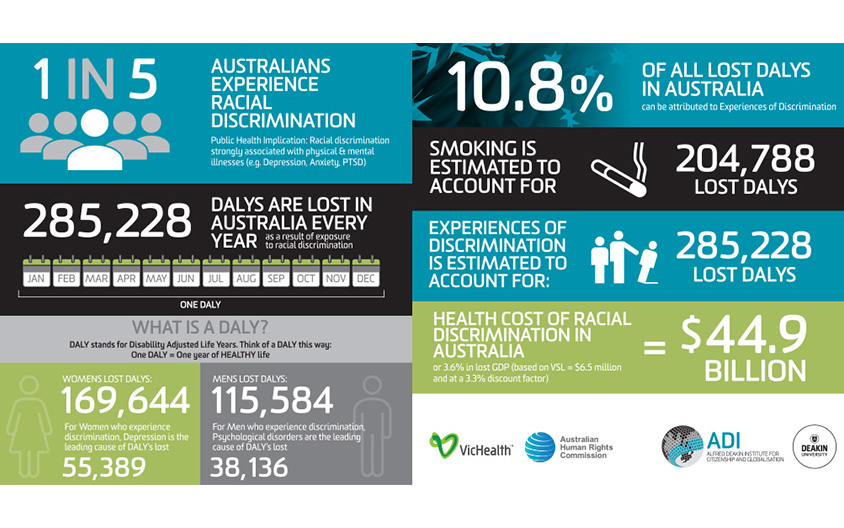The cost of racism to our economy has been established for the first time.
Racial discrimination has cost the Australian economy an estimated $44.9 billion, or 3.6 per cent of GDP, each year in the decade from 2001-11, according to new research from the Alfred Deakin Institute for Citizenship and Globalisation (ADI).
ADI researcher Dr Amanuel Elias outlined the cost in his PhD “Measuring the Economic Costs of Racial Discrimination in Australia”.
The research, supervised by ADI’s Professor Yin Paradies, was supported by an Australian Postgraduate Award (Industry) scholarship as part of a linkage project funded by the Australian Research Council (ARC), Victorian Health Promotion Foundation (VicHealth), and the Australian Human Rights Commission (AHRC).
[testimonial_text]Being able to quantify the cost of racism to Australian society is a crucial step towards addressing racial discrimination.[/testimonial_text]
[testimonial_picture name=”Dr Amanuel Elias” details=”Associate Research Fellow”]
[/testimonial_picture]
“Racial discrimination costs society in both a microeconomic sense, such as indirect costs related to the labour market; and a macroeconomic sense, such as intangibles related to negative physical and mental health.
“Once we know what racial discrimination costs society, we have a strong information base from which to launch an economic argument for making a reasonable effort to reduce racial discrimination.”
In his three-year study, Dr Elias analysed national and state data sets to determine how often Australians experienced racism in order to establish its prevalence. He then examined almost 300 worldwide health studies to identify four highly-relevant mental health outcomes of racial discrimination – depression, anxiety, post-traumatic stress disorder, and psychological disorders.
After combining the data on the four health outcomes with statistics on the prevalence of racism to calculate the number of healthy years of life lost due to experiences of racism he then used established methods in health economics to convert the healthy years of life lost (known as Disability Adjusted Life Years or DALYs) into dollar values.
In his thesis, Dr Elias argues that the economic benefits of tackling racism are likely to outweigh the costs associated with fostering social cohesion.
“The overall economic cost of racial discrimination to an economy can serve as a benchmark to scope the size of anti-discrimination intervention,” Dr Elias said.
“In countries like Australia, where subtle interpersonal racism exists along with some forms of institutional discrimination, anti-discrimination interventions require relatively moderate spending.”
According to Dr Elias, the good news is that racial discrimination is a preventable social phenomenon.
“Research shows that anti-discrimination efforts that focus on the benefits of diversity can succeed in reducing racist attitudes and racial discrimination,” he said.
Race Discrimination Commissioner, Dr Tim Soutphommasane, welcomed Dr Elias’ research.
“We know there is a human cost to racism in our society. Now we know something about the economic cost of it. This research will have an important impact on public understanding about racial prejudice and discrimination,” Dr Soutphommasane said.




